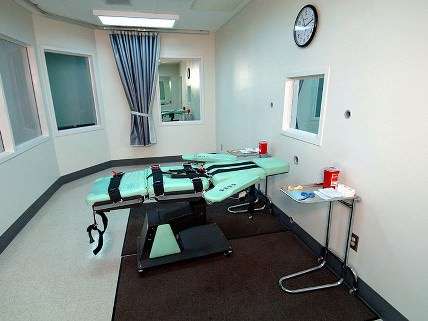Louisiana Tricked a Local Hospital Into Supplying Execution Drugs
Lethal lies.

A new piece published by The Lens reveals that the Louisiana Department of Corrections (LDOC) tricked a local hospital into supplying it with drugs it intended to use for an execution that has since been delayed.
According to documents obtained and published by The Lens's Della Hasselle, the Louisiana Department of Corrections placed an order for one of the two execution drugs it needed, hydromorphone, with Lake Charles Memorial Hospital on January 28th—eight days before condemned child-killer Christopher Sepulvado was scheduled to be executed. The state already had the other drug it needed, midazolam, in stock at the time it placed the order, although the origin of that drug is still unknown.
When the hospital filled the hydromorphone order for LDOC, they assumed it was going to be used to treat sick inmates housed at Louisiana's Elayn Hunt Correctional Center, not to kill a death row inmate housed at the state penitentiary.
A spokesman for the Lake Charles Memorial Hospital told local Louisiana news outlet, KPLC, "At no time did [the hospital] believe or was led to believe that the drug would be used for an execution." Instead, a pharmacist at Elayn Hunt Correctional center told the hospital "they needed the drug, hydromorphone, for a medical patient."
Ulysses Gene Thibodeaux, a board member for Lake Charles Memorial Hospital told The Lens, "Had we known of the real use, we never would have done it."
This isn't the first time Louisiana has used shady tactics in an attempt to obtain lethal injection drugs. Emails released by the publication in January reveal that Louisiana prison officials explored illegally obtaining pentobarbital last September from a compounding pharmacy in Oklahoma that was not licensed to do business in Louisiana.
However, it appears that this is the first time a state has openly lied to a hospital in order to obtain drugs it wanted to use for an execution. What's more, Louisiana broke its own execution protocol in the process, since the drug was ordered 22 days after it was supposed to have already been in stock.
Ultimately, Sepulvado's execution was delayed for at least six-months in order for prison officials to review the "most effective" dosage levels of lethal drugs for its protocol. This delay came shortly after Clayton Lockett's botched execution in Oklahoma, which was carried out using one of the same drugs Louisiana intended to use on Sepulvado.
It's unclear if any actions will be taken against the state in light of this new information. According to Hasselle, "A hospital spokesman hasn't responded to comment when I asked if Lake Charles had any plans to sue the LDOC."
Louisiana state officials have refused to comment on the story, which—let's be honest—shouldn't be all that surprising at this point.


Show Comments (31)